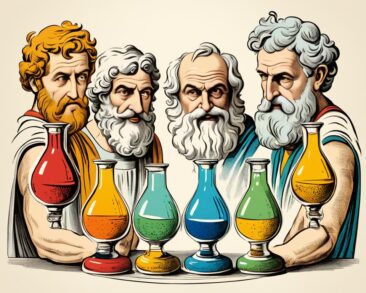Greek Healing Gods
Imagine opening a grand, ancient book, its pages thick with the myths and legends of a vibrant culture. In “The Mystical World Of Traditional Greek Healing Gods And Rituals”, you will do just this. This enthralling piece transports you straight to Greece, guiding you through the exhilarating journey of discovering the rich, complex mythology steeped in its tradition. With stories of divine recovery and powerful rituals, you will get a closer look at how the intricate mysteries of traditional Greek healing practices have survived through the ages. Embark on an expedition that’s equal parts history, culture, and spirituality; an exploration that’s as enchanting as the mystical Greek Gods themselves.

The Concept of Healing in Ancient Greek Mythology
In Ancient Greek mythology, the concept of healing held a spiritual significance that went beyond the mere physical well-being. This unique perspective portrayed good health as a balanced state of body, mind, and spirit – a harmony resulting from divine favor. The Greek understanding of healing considered the maintenance of spiritual morals, stellar ethical standards, and religious rites equally essential for a person’s health.
The spiritual significance of healing
Healing transcended the physical realm to connect with the divine within Ancient Greek society. Obtaining a state of good health was often seen as receiving divine favor, a blessing awarded to those aligning themselves with both moral and religious virtues. The Greeks believed an individual’s well-being was linked to their moral or spiritual standing, underscoring the interconnectedness of body, mind, and spirit. Thus, to them, health was a manifestation of their spiritual wellbeing and a gift from the gods.
The belief in divine intervention
Healing was seen as an act of divine intervention among the Greeks, emphasizing their belief in gods’ omnipotent capabilities to restore health. They believed that gods, especially healing gods like Asclepius and his daughters, actively intervened in matters of health, dispensing diseases, or cures depending on their whims and the individual’s spiritual alignment.
The intertwining of religion, mysticism, and health
Religion and mysticism played a significant role in health among the ancient Greeks. Healing rituals infused mysticism and religious beliefs where invoking healing gods, making votive offerings, and partaking in other ceremonials were common practices. The profound belief in the healing power of divine intervention shaped their health consciousness and, consequently, their health behaviors.
Major Greek Healing Gods
Fascinatingly, the Ancient Greek Pantheon had deities dedicated explicitly to different health aspects.
Apollo: God of light, healing and prophecy
Apollo, famously known as the ‘God of light and the sun,’ also presided over healing and prophecy. He was believed to have the ability to bring forth diseases and take them away. Portrayed as a handsome, youthful deity radiating grace and vigor, Apollo was a beacon of health and wellness.
Asclepius: God of medicine
Asclepius, the ‘God of medicine,’ held a significant position in Greek healing practices. His followers believed in his incredible ability to not only heal ailments but also resurrect the dead. Each healing temple dedicated to Asclepius had a sacred snake, his symbol, signifying the transformation and renewal of health.
Hygieia: Goddess of health, cleanliness, and hygiene
Hygieia, whose name literally means ‘health’ in Greek, was the goddess of good health, cleanliness, and hygiene. She represented the preservation of health through preventative measures like cleanliness and hygiene, offering the Greeks a deeper understanding of disease prevention.
Ancient Healing Temples, Sanctuaries, and Sites
Asclepeion temples
Asclepeions were ancient healing temples dedicated to the healing god Asclepius. They were established as sanctuaries where those seeking healing would journey, hoping for divine intervention. The largest and most famous one, the Epidaurus Asclepeion, was a healing center that incorporated spiritual and physical treatments administered by priests.
Touching sacred objects for healing
Sacred objects within Ancient Greek temples held significant power for healing. Rituals for their veneration were common, with followers believing that touching these holy objects would bring about divine favor and, consequently, healing.
The healing qualities of sacred water sources
Sacred water sources like springs or wells, often found within or near a healing temple, were also considered therapeutic. Bathing or drinking this water was believed to have healing properties, with the divine sanctifying it.
Healing Rituals and Practices
The use of healing herbs and plants
Ancient Greeks often used herbs and plants for healing purposes. They believed these plants held divine qualities, attributing their medicinal properties to the influence of the healing gods.
The ritual of incubation
One unique healing practice was the ritual of incubation. This detailed ritual took place in Asclepeion temples, consisting of specific cleansing routines, sacrificial offerings, and sleeping overnight in the temple, hoping for a divine healing dream revelation.
Sacrifices and votive offerings
Making sacrifices and leaving votive offerings were also integral healing practices. These goodwill acts were believed to appease the gods, invoking their favor for healing or expressing gratitude for recovery.

The Role of Priests and Priestesses in Healing
Healing through divine communication
Priests and priestesses were seen as a vital link between the divine realm and the earthly world. They performed rituals, offering communication with the gods, beseeching healing on behalf of the ill, or interpreting divine healing messages.
Function as both spiritual and medical healers
The priests and priestesses also functioned as healers, not just spiritually but medically. They were skilled in ancient medicinal practices like surgery, concocting medicinal potions, and other targeted therapies, maintaining the equilibrium between the spiritual and physical health of the people.
The training of priesthood in ancient medicine
Their essential role in health and healing demanded rigorous training and education. They were often versed in medical knowledge, studying healing herbs, surgical practices, and body anatomy.
Healing Gods in Greek Literature and Drama
Portrayal of healing gods in epic poems
Greek literature is rich in mythical tales and characters, with healing gods often featured in epic poems. These stories glorified their divine capabilities, depicting them as revered healers in dramatic scenarios.
Medical dilemmas in Greek tragedies
Greek tragedies frequently present stories with riveting medical dilemmas. The resolution, often showcasing divine intervention by healing gods, underscored the spiritual aspects of health and disease.
Influence of healing myths in literature
Healing myths significantly influenced the overall Greek literature content. They not only framed the narrative in epic tales, but they also shaped the philosophies explored in these works, highlighting the importance Greeks placed on health and spirituality.
Influence of the Greek Healing Gods on Medicine
Origins of the Hippocratic Oath
The Greek healing gods’ profound influence is evident in the origins of the Hippocratic Oath, a symbolic declaration sworn by physicians, binding them to moral and ethical medical conduct. It was named after the ancient physician Hippocrates and considered Asclepius and his daughters.
Birth of medical ethics
The role of Greek healing gods also contributed to the birth of medical ethics. Their healing stories demonstrated the importance of proper conduct, compassion, and confidentiality, principles that continue to guide modern medicine.
Influence in the development of medical practices
Greek medicinal practices influenced by their healing gods played a significant role in shaping modern medicine. Temple healing practices like surgeries, rehabilitation, and the use of medicinal plants have transcended time to remain integral parts of modern healthcare.
The Healing Gods and Greek Philosophy
Exploration of health and disease in Greek philosophy
Greek philosophy often delved into exploring the nature of health and disease. The influence of the healing gods sparked discussions about the soul’s well-being and physical health alignment and the importance of hygiene and cleanliness.
Influence of Asclepius in the philosophy of Socrates
Socrates, a towering figure in Greek philosophy, was known to have been profoundly influenced by Asclepius. His teachings emphasized the role of the mind in affecting overall health, echoing the holistic health approach of the Greeks.
Hygiene and healthy living in Greek philosophical schools
The Greek philosophical schools espoused the virtues of hygiene and healthy living, attributing it to the influence of Hygieia, the goddess of health, cleanliness, and hygiene. These schools believed that maintaining a lifestyle promoting cleanliness and a balanced diet was vital to sustaining good health.

Modern Interpretations and Continuation of Healing Rituals
Modern representations of Greek healing gods
Modern-day Greek culture continues to embody representations of Ancient Greek healing gods. Depictions are found in literature, art, architecture, and even in the names of healthcare institutions. These enduring symbols are powerful reminders of Greece’s rich healing heritage.
Survival of ancient healing practices in modern Greece
Many ancient Greek healing practices continue in modern Greece, often intertwined within religious rituals. Practices such as blessing the ill, using consecrated oils, or using medicinal plants reflect the enduring belief in spiritual healing.
Greek healing gods and modern paganism
Modern paganism, with its focus on nature and spirituality, has seen a resurgence in the reverence for Ancient Greek healing gods. Many practitioners incorporate rites and prayers to these gods within their healing rituals, reflecting an enduring respect for these ancient deities.
Greek Healing Gods in Modern Medicine
Symbolism of Greek healing gods in medicine
The symbolic representations of Greek healing gods are common in modern medical practices. The stethoscope, a global emblem of medicine, was traced back to the Asclepeion’s Rod, an association with Asclepius. Similarly, Hygieia’s bowl with a snake is commonly recognized as the symbol of pharmacy.
Impact of Greek healing concepts on psychological therapy
Modern psychological therapy owes much to ancient Greek health philosophies. The emphasis on balanced mental health and recognize the impact of emotions and mental states on one’s physical well-being has become a focal point in therapy, drawing directly from Greek ideas.
Continuing reverence for the Hippocratic Oath
To this day, physicians worldwide swear the Hippocratic Oath, a lasting tribute to the age-old traditions of Greek healing. The enduring principles enshrined in the oath continue to define medical ethics, underscoring the holistic nature of healthcare and the moral obligations of medical practitioners.
Greek Healing Gods
Greek mythology is rich with deities associated with healing and medicine. Here are three authoritative and comprehensive websites that delve into Greek healing gods, offering insights into their stories, significance, and how they were worshipped:
- Theoi Greek Mythology – Theoi.com provides an extensive collection of information on Greek mythology, including the healing gods. It offers detailed profiles on deities such as Asclepius, the god of medicine, and his daughters known as the Asclepiades, who were associated with various aspects of health and healing. The site combines ancient texts and modern interpretations to give a full picture of how these gods were revered and their roles in Greek mythology.
- Greek Gods & Goddesses – GreekGodsAndGoddesses.net is a resourceful website dedicated to the deities of ancient Greece, including those related to healing. It features articles on gods like Apollo, who had connections to healing and plague, and his son Asclepius. The site is useful for understanding the broader context of healing within the pantheon, including myths, symbols, and temples dedicated to these deities.
- Ancient History Encyclopedia – Now known as World History Encyclopedia (WorldHistory.org), this site offers well-researched, peer-reviewed articles on a broad range of topics, including Greek mythology. Its entries on Asclepius and other healing deities provide insights into their historical worship, archaeological evidence of their cults, and their lasting influence on medical symbols used today. The encyclopedia is a great starting point for academic research or general interest reading.
These websites collectively offer a comprehensive look into Greek healing gods, from their mythological origins to their worship and cultural significance, making them valuable resources for anyone interested in this aspect of ancient Greek religion.
